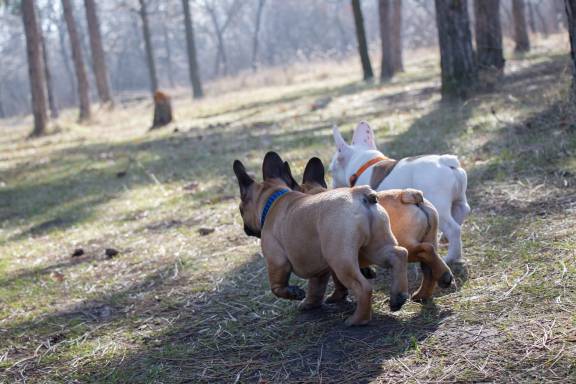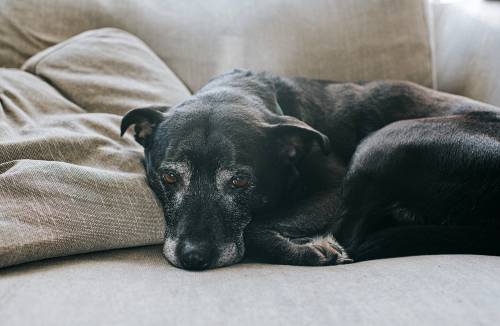Connect with a verified veterinarian in minutes. Licensed vets are available 24/7 to answer your questions. No need to worry about your furry family member.
Most of the time, your dog may have a neutral smell, and then one day, you smell something fishy. It seems to be associated with your dog. Wherever he is, you smell that fish-like odor. What on earth could it be?
As you get closer, you notice the fishy smell seems to be coming from your dog’s rear end. UGH! But what could be causing that fishy smell from your dog’s tail end? Does he eat fish or take fish oil omega three supplements? If no, then there’s a different reason for the smell.
It could be caused by your dog’s anal glands. Sometimes the glands can become impacted and then begin to smell like fish.
What are Anal Glands?
Anal glands also referred to as anal sacs, are part of a dog’s anatomy. These small glands are found on both sides of a dog’s anus. The glands have a purpose, too. They are a type of specialized sweat gland that’s made to produce an unpleasant smell. That smell is your dog’s unique odor, which is a scent marker for other dogs. Many people say the odor is like a fishy smell.
When a dog poops, the anal glands secrete that special smell at the same time. So, your dog’s poop has that unique smell. When other dogs find the poop, they gain a lot of information about your dog. They learn about your dog’s sex, health, and more.
In addition, a dog’s anal glands may produce secretions when the dog is scared.
If your dog’s rear end has started to smell like fish, then the odor is probably coming from the anal glands. It also means there may be a problem with the glands.
Anal Gland Disease
Anal glands in dogs can develop any number of problems, including the following:
Impaction: happens when the anal glands are not completely emptied of fluid. When this happens, the fluid may dry and cause an impaction. This means the glands are not able to secrete (express) the fluid. The sacs may become hard and painful. If left untreated, impacted glands can develop abscesses.
Infections & abscesses: the anal glands can become infected or even abscessed if they are not treated. They become painful and may even appear swollen and discolored. If the abscesses are not treated, they can eventually burst through the skin. If they are bad enough, the abscesses may even require surgery.
Anal sac tumors: can also be a problem with anal glands. The tumors, similar to an impaction, can keep your dog’s glands from expressing the fluid inside properly, if at all. Tumors can be cancerous; so, the vet will take a biopsy and do an ultrasound to make a proper diagnosis.
As you can see, anal gland disease can be pretty serious and painful for your fur baby. So, if you notice that fishy smell coming from your dog’s tail end, then it’s time to see the vet. Don’t let the problem go untreated, as it can lead to even more serious medical problems for your dog.

Review symptoms, medications & behavior to keep your pets healthy with a Vet Online in just minutes.
Ask a Vet Live NowSymptoms of Anal Gland Disease
You may notice these symptoms if your dog has developed anal gland disease:
Your dog may do the tail scoot on carpeting, in the grass, etc.
- Biting or licking at the anus
- Fishy odor near the anus
- Difficulty pooping
- May cry when pooping (due to pain)
- Lump near the rectum
- Blood/pus in the dog’s stool
If you notice any of these symptoms, then it’s time to call the vet. Don’t let the problem go untreated.
Treatment of Anal Gland Disease
At the vet’s, they will perform a complete physical exam of your dog. They may also order lab work. Once the vet has made a diagnosis of an anal gland problem, then he will develop a treatment plan.
Treatment may start with manual expression of the anal glands. However, if there’s an impaction, the vet may need to use a saline rinse or another softening agent to help soften the dried fluid inside. When the dried, impacted material has been removed, the vet will then clean out the glands.
If the glands are infected or abscessed, the vet will clean them out with an antiseptic. Your dog will probably also require a course of antibiotics to deal with the infection. The vet may recommend warm compresses be applied to the area to help relieve the pain of an abscess.
It is possible the anal glands won’t respond to treatment. If that should happen, the vet may recommend surgery to remove the glands and any tumors that may be present. Rest assured that this surgery usually helps your dog have a better quality of life, especially if he continuously suffers from anal gland problems.
The vet may also teach you how to manually express your dog’s anal glands. While this may seem gross, remember that your dog may need help. Keeping his anal glands from becoming impacted or developing a disease is part of being a responsible pet parent. Plus, you’ll help him feel better and avoid the painful problems that can develop with anal gland disease.
Preventing Anal Sac Disease
Your vet may recommend different ways to help your dog avoid anal sac disease in the future. The vet may suggest taking these measures to prevent anal sac disease:
Change your dog’s diet: your fur baby may need a diet that’s higher in fiber and low in fat to avoid anal sac disease. There are dog foods that are specifically developed to contain more fiber for dogs that have anal sac issues.
Help your dog lose weight: anal sac disease is more common in dogs that are overweight or obese. So, the vet may recommend helping your dog lose some weight. The vet will provide you with specific guidance on the proper diet, exercise, and more for your dog’s age and activity level.
More exercise: increasing your dog’s activity level can help keep anal glands from being a problem. And it doesn’t have to be long hikes in the mountains. Just walking your dog a little farther and more often can make a huge difference.
So, there you have it! If you notice a fishy smell coming from your dog’s rear end, then it’s time to see fi the vet. You want to make sure your dog has developed an infection or another problem with his anal glands.
And remember, if the vet advises regular expression of your dog’s anal sacs, then be sure to follow through. Your fur baby completely depends on you for his care. Expressing his anal sacs may not sound like a wonderful thing, but it will help keep your dog healthier and happier in the long run.
Connect with a verified veterinarian in minutes. Licensed vets are available 24/7 to answer your questions. No need to worry about your furry family member.

Kyoko
Kyoko is from a family of 3 and moved to New York with her parents and siblings when she was 13. Kyoko is fond of spending a great amount of time with pets, specifically her beagle Luna and cat Missy. Her boyfriend often complains that she spends too much time giving attention to their animals. Kyoko has written dozens of articles concerning pets and is aiming at owning a pet shop one day!
Review symptoms, medications & behavior to keep your pets healthy with a Vet Online in just minutes.
Ask a Vet Live Now




